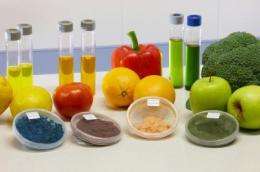Products of biotechnological origin using vegetable and fruit by-products generated by the industry

More than 192 million tonnes of fruit and vegetable waste is produced in Europe every year. The continued use of oil as a raw material is a serious obstacle in the way of sustainable industrial development, since it is harmful for the environment, jeopardises supply security, and contributes to the exhausting of non-renewable raw materials. By contrast, the production of chemical and industrial products from renewable raw materials is starting to emerge. In this context, Tecnalia will be developing new products of biotechnological origin using the products not used in the processing of fruit and vegetables as raw materials, since they constitute renewable matter with a high potential as a raw material for industry.
Through the TRANSBIO project, Tecnalia will be implementing biotechnological solutions, like fermention and enzymatic processes to obtain new, high-value products of biotechnological origin in the form of new materials offering the potential to replace current plastics, foodstuffs and enzymes for applications in detergents using the materials not taken advantage of in the fruit and vegetable processing industry. This way, the global sustainability of the biomass production and processing industry will be improved, and the competitiveness of the European biotechnology industry will be enhanced through new applications.
As a result of these processes, new and more sustainable plastic materials will be obtained to be used in food packaging application, enzymes for producing detergents, and other biotechnological products for application in foodstuff.
In parallel, and in order to achieve the total use of the by-products employed in the project, those that may not be suited for use in biotechnological processes and the waste materials coming from fermentation processes will be tested to assess their use as raw material for the production of biogas.
The consortium participating in the TRANSBIO project comprises various partners from the ambit of industry and the academic sector with experience in complementary fields. The combination of these synergies allows all the links in the value chain to be taken into consideration, from the reprocessing of by-products, fermentation, and right up to the processing of the final product.
Tecnalia is coordinating this international consortium that has 16 partners from nine countries and two continents (Latin America and Europe) to look into the potential of new biotechnological solutions for obtaining bioproducts that, in practice, will signify the cutting of the environmental impact of food-producing activities.
Provided by Elhuyar Fundazioa

















